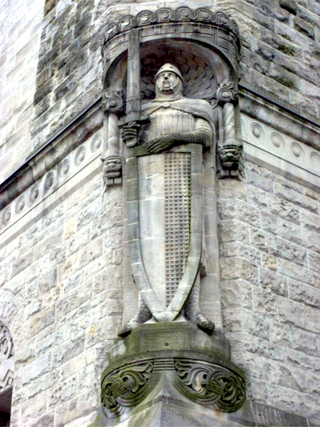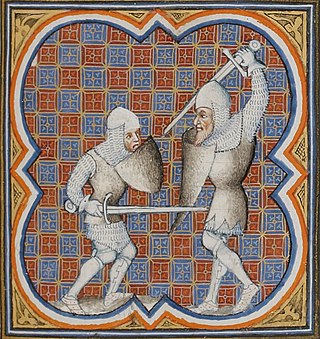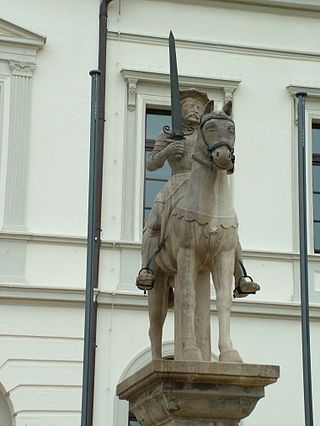
Roland was a Frankish military leader under Charlemagne who became one of the principal figures in the literary cycle known as the Matter of France. The historical Roland was military governor of the Breton March, responsible for defending Francia's frontier against the Bretons. His only historical attestation is in Einhard's Vita Karoli Magni, which notes he was part of the Frankish rearguard killed in retribution by the Basques in Iberia at the Battle of Roncevaux Pass.

Orlando furioso is an Italian epic poem by Ludovico Ariosto which has exerted a wide influence on later culture. The earliest version appeared in 1516, although the poem was not published in its complete form until 1532. Orlando furioso is a continuation of Matteo Maria Boiardo's unfinished romance Orlando innamorato. In its historical setting and characters, it shares some features with the Old French Chanson de Roland of the eleventh century, which tells of the death of Roland. The story is also a chivalric romance which stemmed from a tradition beginning in the late Middle Ages and continuing in popularity in the 16th century and well into the 17th.

The Song of Roland is an 11th-century chanson de geste based on the Frankish military leader Roland at the Battle of Roncevaux Pass in AD 778, during the reign of the Carolingian king Charlemagne. It is the oldest surviving major work of French literature. It exists in various manuscript versions, which testify to its enormous and enduring popularity in Medieval and Renaissance literature from the 12th to 16th centuries.

The chanson de geste is a medieval narrative, a type of epic poem that appears at the dawn of French literature. The earliest known poems of this genre date from the late 11th and early 12th centuries, shortly before the emergence of the lyric poetry of the troubadours and trouvères, and the earliest verse romances. They reached their highest point of acceptance in the period 1150–1250.

Renaudde Montauban was a legendary hero and knight which appeared in a 12th-century Old French chanson de geste known as The Four Sons of Aymon. The four sons of Duke Aymon are Renaud, Richard, Alard and Guiscard, and their cousin is the magician Maugris. Renaud possesses the magical horse Bayard and the sword Froberge.
The Matter of France, also known as the Carolingian cycle, is a body of literature and legendary material associated with the history of France, in particular involving Charlemagne and his associates. The cycle springs from the Old French chansons de geste, and was later adapted into a variety of art forms, including Renaissance epics and operas. Together with the Matter of Britain, which concerned King Arthur, and the Matter of Rome, comprising material derived from and inspired by classical mythology, it was one of the great European literary cycles that figured repeatedly in medieval literature.
Durendal, also spelled Durandal, is the sword of Roland, a legendary paladin and partially historical officer of Charlemagne in French epic literature. It is also said to have belonged to young Charlemagne at one point, and, passing through Saracen hands, came to be owned by Roland.

Maugris or Maugis was one of the heroes of the chansons de geste and romances of chivalry and the Matter of France that tell of the legendary court of King Charlemagne. Maugis was cousin to Renaud de Montauban and his brothers, son of Beuves of Aygremont and brother to Vivien de Monbranc. He was brought up by Oriande the fairy, and became a great enchanter. He won the magical horse Bayard and the sword Froberge which he later gave to Renaud.

Bradamante is a fictional knight heroine in two epic poems of the Renaissance: Orlando Innamorato by Matteo Maria Boiardo and Orlando Furioso by Ludovico Ariosto. Since the poems exerted a wide influence on later culture, she became a recurring character in Western art.

Atlantes was a powerful sorcerer featured in chansons de geste. In Boiardo's Orlando Innamorato (1482), where he is known as Atalante, the magician fears that Rugiero will convert to Christianity and aid Charlemagne against the Saracens. To prevent this and forestall Rugiero's death, he constructs a magic garden ringed by glass on Mt. Carena in the Atlas Mountains, after which he is named. In Orlando Furioso, Atlantes' magical castle is filled with illusions, in order to divert Ruggiero from what he has foretold as certain doom. Ruggiero is later set free by Bradamante and after numerous trials and quests sires a great line of heroes. He later dies betrayed fulfilling the destiny foretold by Atlantes.

Fierabras or Ferumbras is a fictional Saracen knight appearing in several chansons de geste and other material relating to the Matter of France. He is the son of Balan, king of Spain, and is frequently shown in conflict with Roland and the Twelve Peers, especially Oliver, whose prowess he almost rivals. Fierabras eventually converts to Christianity and fights for Charlemagne.

Ferragut was a character—a Saracen paladin, sometimes depicted as a giant—in texts dealing with the Matter of France, including the Historia Caroli Magni, and Italian epics, such as Orlando Innamorato by Matteo Maria Boiardo and Orlando Furioso by Ludovico Ariosto. In the tales, he was portrayed as physically invulnerable except at his navel/stomach, and was eventually killed by the paladin Roland.

The Historia Caroli Magni, also known as the Historia Karoli Magni et Rotholandi or the (Pseudo-)Turpin Chronicle, is a 12th-century Latin chronicle consisting of legendary material about Charlemagne's campaigns in Spain. The chronicle states it was written by Charlemagne's contemporary Turpin, Archbishop of Reims, but it was found out as a medieval forgery. The work was extremely popular, and served as a major source of material on Charlemagne in chronicles, fiction and iconography throughout Medieval Europe. The miracles of the flowering lances and the death of Ferracutus appear on the windows of Chartres cathedral.

Angelica is a princess in the epic poem Orlando innamorato by Matteo Maria Boiardo. She reappears in the saga's continuation, Orlando furioso by Ludovico Ariosto, and in various later works based on the two original Orlando pieces. The narratives are part of the Matter of France, a cycle of legendary history stories based on the adventures of Charlemagne and his paladins.

The Paladins, also called the Twelve Peers, are twelve legendary knights, the foremost members of Charlemagne's court in the 8th century. They first appear in the medieval chanson de geste cycle of the Matter of France, where they play a similar role to the Knights of the Round Table in Arthurian romance. In these romantic portrayals, the chivalric paladins represent Christianity against a Saracen (Muslim) invasion of Europe. The names of the paladins vary between sources, but there are always twelve of them led by Roland. The paladins' most influential appearance is in The Song of Roland, written between 1050 and 1115, which narrates the heroic death of Roland at the Battle of Roncevaux Pass.
Agolant or Agolante is a fictional character in Medieval and Renaissance romantic epics dealing with the Matter of France, including Orlando innamorato by Matteo Maria Boiardo and Orlando furioso by Ludovico Ariosto. He is a Saracen king from Africa.

Veillantif (French), Vielantiu ; Vegliantin, Vegliantino or Brigliadoro (Italian) is the name of Roland the paladin's trustworthy and swift steed in the stories derived from the chansons de geste. The French name comes from an expression meaning "vigilant". Veillantif is first mentioned in The Song of Roland.
Girart de Vienne is a late twelfth-century (c.1180) Old French chanson de geste by Bertrand de Bar-sur-Aube. The work tells the story of the sons of Garin de Monglane and their battles with the Emperor Charlemagne, and it establishes the friendship of the epic heroes Olivier and Roland.

Galiens li Restorés, or Galien le Restoré or Galien rhétoré, is an Old French chanson de geste which borrows heavily from chivalric romance. Its composition dates anywhere from the end of the twelfth century to the middle of the fourteenth century. Five versions of the tale are extant, dating from the fifteenth century to the sixteenth century, one in verse and the others in prose. The story—which is closely linked to the earlier chansons de gestePèlerinage de Charlemagne and The Song of Roland —tells of the adventures of Galien, son of the hero Olivier and of Jacqueline, the daughter of the (fictional) emperor Hugon of Constantinople.

Mandricardo is a character from the Matter of France, featured in the Italian romantic epic poems Orlando innamorato by Matteo Maria Boiardo and Orlando furioso by Ludovico Ariosto.















